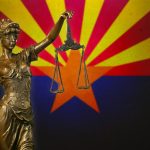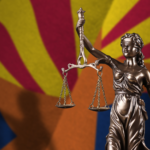Today, attorneys for the Goldwater Institute and Andrew Gould at Holtzman Vogel made a crucial stand for the freedom of speech and association before the Arizona Supreme Court, arguing that the state’s 2022 donor-doxxing law, Proposition 211, clearly violates the Arizona Constitution.
While proponents of the Voters’ Right to Know Act say they’re simply combatting so-called “dark money” in politics, it is clear to Goldwater and its clients — the Center for Arizona Policy, the Arizona Free Enterprise Club, and individual donors — that their real intent is to intimidate their political opponents into silence.
It is well documented that donor disclosure mandates in other states have led to retaliation and even violence against nonprofits and their supporters.
Proposition 211 is unconstitutional. The law forces nonprofits that speak about a ballot measure or mention an incumbent lawmaker near an election to disclose to the government their donors’ names, addresses, employers, and donation amounts. Those donors would have their private information compiled on a publicly available government database. But the Arizona Constitution forbids the state from stripping people of their privacy for supporting causes in which they believe.
Proponents of Proposition 211 say they support transparency. But transparency is for the government. Privacy is for individuals.
“Arizona’s Proposition 211 is as un-American as it is dangerous. No one should be exposed to retaliation or violence simply for supporting causes they believe in,” says Jon Riches, the Goldwater Institute’s Vice President of Litigation. “The law also violates Arizona’s Constitution, which provides stronger protections for freedom of speech and privacy than even the U.S. Constitution. That’s why we at the Goldwater Institute believe the Arizona Supreme Court will ultimately strike down Proposition 211.”
Peter Gentala, President of the Center for Arizona Policy, says Proposition 111 “creates an atmosphere of fear among those who support nonprofits that engage in the most pressing issues in Arizona today.”
“Our attorneys from the Goldwater Institute appeared before the Arizona Supreme Court today because Prop 211 stifles dialogue, chills speech, and silences nonprofits by deterring donations to important causes, robbing our civil discourse of vital voices from churches, schools, and charities,” Gentala says. “This measure revives tactics from the 1950s, when Southern states nearly ended the NAACP by forcing it to disclose its supporters’ identities under the guise of transparency, aiming to intimidate and suppress. The U.S. Supreme Court rightly struck down those despicable tactics, affirming that freedom of association needs breathing room to survive. Arizona’s laws should ensure transparency for government and protect the privacy of citizens, not the reverse.”
Scot Mussi, President of the Arizona Free Enterprise Club, calls Proposition 211 “a dangerous threat to our right to free speech and association.”
“As drafted, the law can be used to unconstitutionally target and harass private citizens, including our organization and our supporters,” Mussi says. “We are confident that the Supreme Court will recognize the danger this law poses and will rule in our favor.”
By striking down Proposition 211, the Arizona Supreme Court can offer the first clear roadmap for mounting state constitutional challenges to donor-doxxing laws nationwide.
Former Arizona Supreme Court Justice Andrew Gould joined the Goldwater Institute in this case and presented oral argument today. This was Goldwater’s 13th time defending constitutional rights before the Arizona Supreme Court.
Read the complaint and other case documents here.










